Clyde has always been a very healthy dog yet as he’s approaching 11 years old, I have been getting more worried about potential problems. Being a veterinarian I see every day the diseases and illnesses that dogs develop, especially older dogs.
We noticed a small amount of blood in Clyde’s mouth one Thursday and did not think anything of it. Initially I suspected that he might have hit his mouth on something or bitten his lip. It was cleaned up and no further blood was seen. Two days later, a small amount of blood was again seen in the same area. When I opened his mouth and looked into the back of it I saw two raised red masses around his last left upper molar. Knowing that oral tumors/masses are generally bad news, I immediately suspected the worst.
Two days later, on a Monday, I brought Clyde to the office where an incision biopsy and CT scan of his head were performed. Just a few weeks prior, routine lab work, chest radiographs, an abdominal ultrasound, and echocardiogram had been performed so I knew he was “relatively” healthy. The CT scan revealed a somewhat large soft tissue mass in the maxilla extending up into the right orbit. Several days later, the biopsy returned as an acanthomatous ameloblastoma (previously called epulis). This is a benign but locally aggressive tumor. Surgery can be curative but in Clyde’s case the tumor was in a bad area to try and remove because of its close proximity to his eye/orbital structures. Radiation therapy has been shown to also be effective in treating these tumors so I had a discussion with Dr. Jen Arthur, the radiation oncologist at Georgia Veterinary Specialists.
After discussion with Dr. Arthur, a treatment plan for radiation therapy was implemented. Clyde would receive 18 fractions (doses) of radiation on a daily basis (Mondays through Fridays). The long term prognosis is good to excellent with this therapy (>90% of these tumors respond and are controlled). This was definitely good news but Clyde would need to be brought to the hospital daily for several weeks and he would be anesthetized for each treatment. I was concerned that for an almost 11 year old dog this would be difficult for him to endure.
Clyde began his treatment the day after Memorial Day. For the first week or so, no noticeable effects were seen other than Clyde acting more tired than normal. We changed his food to soft food only because during the second half of his treatment he began developing typical early effects of radiation on his tongue and gums. He developed a mucositis which is an inflammation of these areas causing him to salivate more and exhibit a tenderness to his left eye area and mouth. He was started on anti-inflammatory and pain medications to help alleviate this. Typically these effects are self-limiting and resolve after 2-3 weeks post therapy.
Clyde recently finished his treatment and everyone celebrated! One of the doctors made him cupcakes and he was given a soft toy from one of the radiation therapy technicians. After several days of rest he seems to be feeling pretty well. Currently his tumor has shrunken a lot and in some areas is no longer visible.






